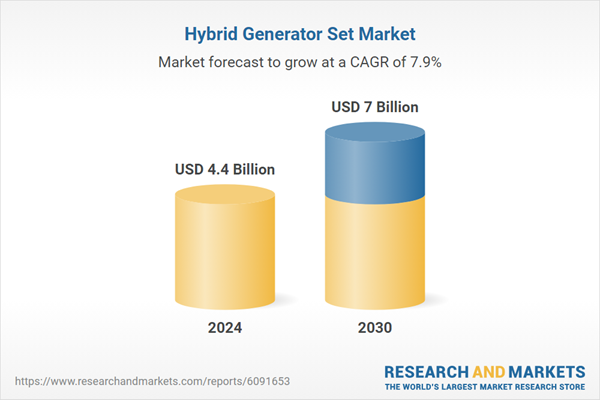Speak directly to the analyst to clarify any post sales queries you may have.
10% Free customizationThis report comes with 10% free customization, enabling you to add data that meets your specific business needs.
These systems are gaining traction across off-grid, industrial, and remote applications due to their efficiency, reliability, and cost-saving benefits. Hybrid sets offer operational flexibility by seamlessly switching between energy sources, minimizing fuel consumption, and reducing carbon footprints. Moreover, supportive government regulations and technological advancements in energy storage and smart control systems are enhancing market feasibility. The push for decentralized energy solutions and rising energy demands in critical sectors such as construction, mining, telecommunications, and utilities are expected to further fuel the market’s growth trajectory globally.
Key Market Drivers
Sustainability and Environmental Regulations
Heightened focus on climate change mitigation and stricter global emission regulations are propelling the adoption of hybrid generator sets. These systems integrate renewable sources like solar or wind with conventional generators, significantly reducing fuel consumption and greenhouse gas emissions. Hybrid setups are gaining favor in sectors with high energy demand and environmental accountability, including construction, mining, and telecom. Regulatory pressure from global frameworks and national policies - particularly in the EU, U.S., and parts of Asia - are compelling companies to invest in cleaner power solutions. The launch of fuel-agnostic technologies like Hyliion's KARNO generator in 2023 further reflects the market’s transition toward low-emission energy innovations. This regulatory environment is encouraging both manufacturers and end users to adopt hybrid systems that align with long-term sustainability goals.Cost Efficiency and Fuel Flexibility
Hybrid generator sets are increasingly preferred for their cost-effectiveness and ability to optimize fuel usage. By combining renewables with diesel or gas generators, these systems reduce operational expenses by cutting down on fuel consumption. Industries operating in fuel-sensitive or remote areas - such as mining, construction, and oil & gas - can benefit from the ability of hybrid sets to switch between fuel types and integrate energy storage. This not only stabilizes energy costs but also ensures uninterrupted power supply in challenging environments. Stored renewable energy from solar or wind can be used during low-production hours, decreasing reliance on fossil fuels and enhancing system efficiency. Over time, these savings in fuel and maintenance contribute to a strong return on investment, making hybrid systems financially viable despite higher initial costs.Key Market Challenges
High Initial Investment Costs
Despite their long-term benefits, the high upfront cost associated with hybrid generator sets remains a major barrier to adoption. These systems require integration of multiple components - renewable sources, batteries, advanced controllers, and generators - leading to elevated capital expenses. Specialized design, installation, and maintenance needs further add to the cost burden. Small and medium enterprises and buyers in developing regions often struggle to justify the initial investment, especially when operating under tight budget constraints. Moreover, hybrid systems can be complex to manage, requiring trained personnel and advanced monitoring to ensure optimal performance and compliance with safety standards. Without supportive financial mechanisms or subsidies, these costs limit the scalability of hybrid generator systems in price-sensitive markets.Key Market Trends
Increasing Adoption of Renewable Energy Integration
A defining trend in the hybrid generator set market is the growing integration of renewable energy sources, particularly solar and wind, into traditional generator systems. Businesses and governments alike are prioritizing energy solutions that align with environmental targets and reduce operational dependency on volatile fuel markets. Hybrid setups not only meet emission standards but also deliver energy security by storing excess renewable energy in batteries for future use. These solutions are especially beneficial in remote or off-grid regions, where fuel delivery is inconsistent or expensive. As battery technology and control systems evolve, renewable integration becomes more seamless and efficient. This trend is set to accelerate as energy transition policies push industries to adopt sustainable power alternatives at scale.Key Market Players
- Ashok Leyland
- Atlas Copco
- Caterpillar
- Cummins
- Deere & Company
- FG Wilson
- Generac Power Systems
- MAHINDRA POWEROL
Report Scope:
In this report, the Global Hybrid Generator Set Market has been segmented into the following categories, in addition to the industry trends which have also been detailed below:Hybrid Generator Set Market, By Power Rating:
- 50 kW
- 50-100 kW
- 100-250 kW
- >250 kW
Hybrid Generator Set Market, By Fuel Type:
- Diesel
- Natural Gas
- Biodiesel
Hybrid Generator Set Market, By Application:
- Commercial
- Industrial
- Residential
- Utilities
Hybrid Generator Set Market, By Region:
- North America
- United States
- Canada
- Mexico
- Europe
- Germany
- France
- United Kingdom
- Italy
- Spain
- Asia Pacific
- China
- India
- Japan
- South Korea
- Australia
- South America
- Brazil
- Colombia
- Argentina
- Middle East & Africa
- Saudi Arabia
- UAE
- South Africa
Competitive Landscape
Company Profiles: Detailed analysis of the major companies present in the Global Hybrid Generator Set Market.Available Customizations:
With the given market data, the publisher offers customizations according to a company's specific needs. The following customization options are available for the report.Company Information
- Detailed analysis and profiling of additional market players (up to five).
This product will be delivered within 1-3 business days.
Table of Contents
Companies Mentioned
- Ashok Leyland
- Atlas Copco
- Caterpillar
- Cummins
- Deere & Company
- FG Wilson
- Generac Power Systems
- MAHINDRA POWEROL
Table Information
| Report Attribute | Details |
|---|---|
| No. of Pages | 188 |
| Published | May 2025 |
| Forecast Period | 2024 - 2030 |
| Estimated Market Value ( USD | $ 4.4 Billion |
| Forecasted Market Value ( USD | $ 7 Billion |
| Compound Annual Growth Rate | 7.9% |
| Regions Covered | Global |
| No. of Companies Mentioned | 8 |









